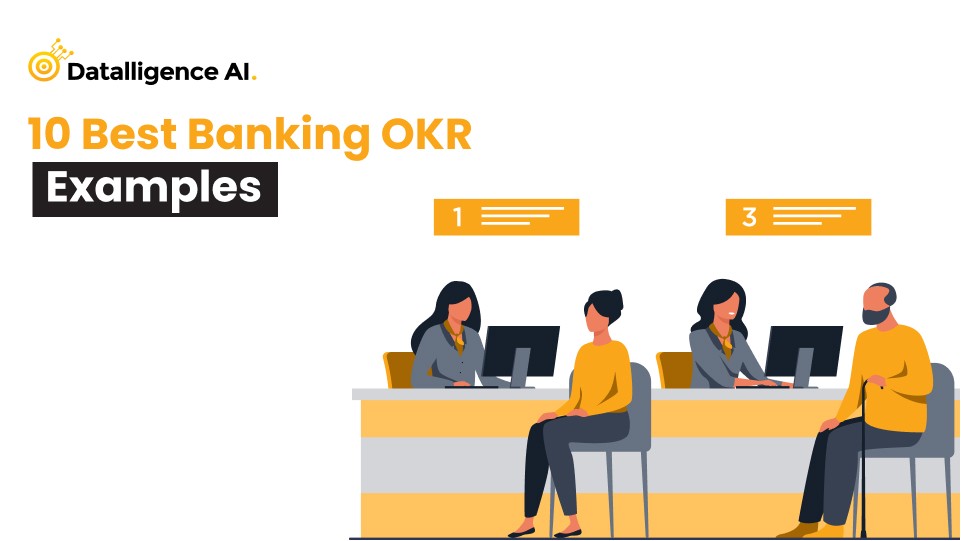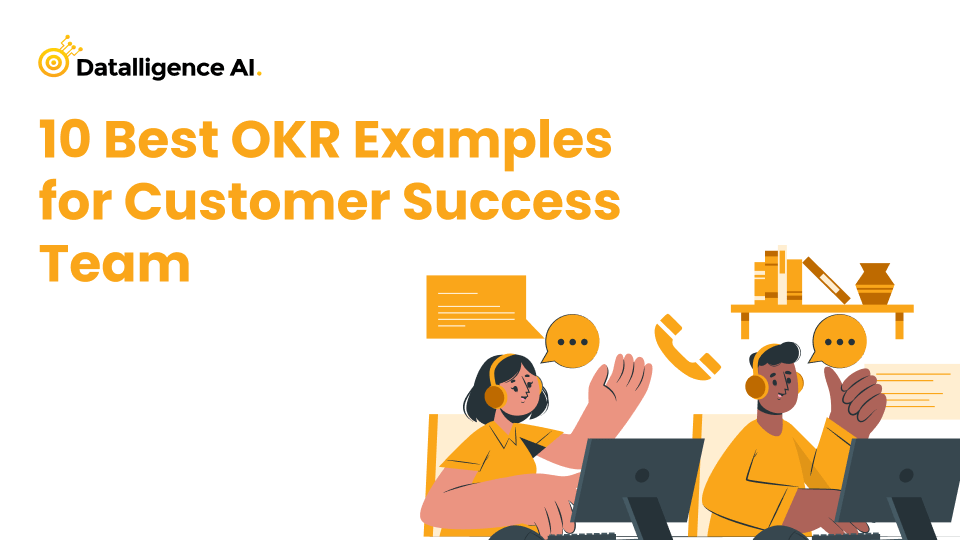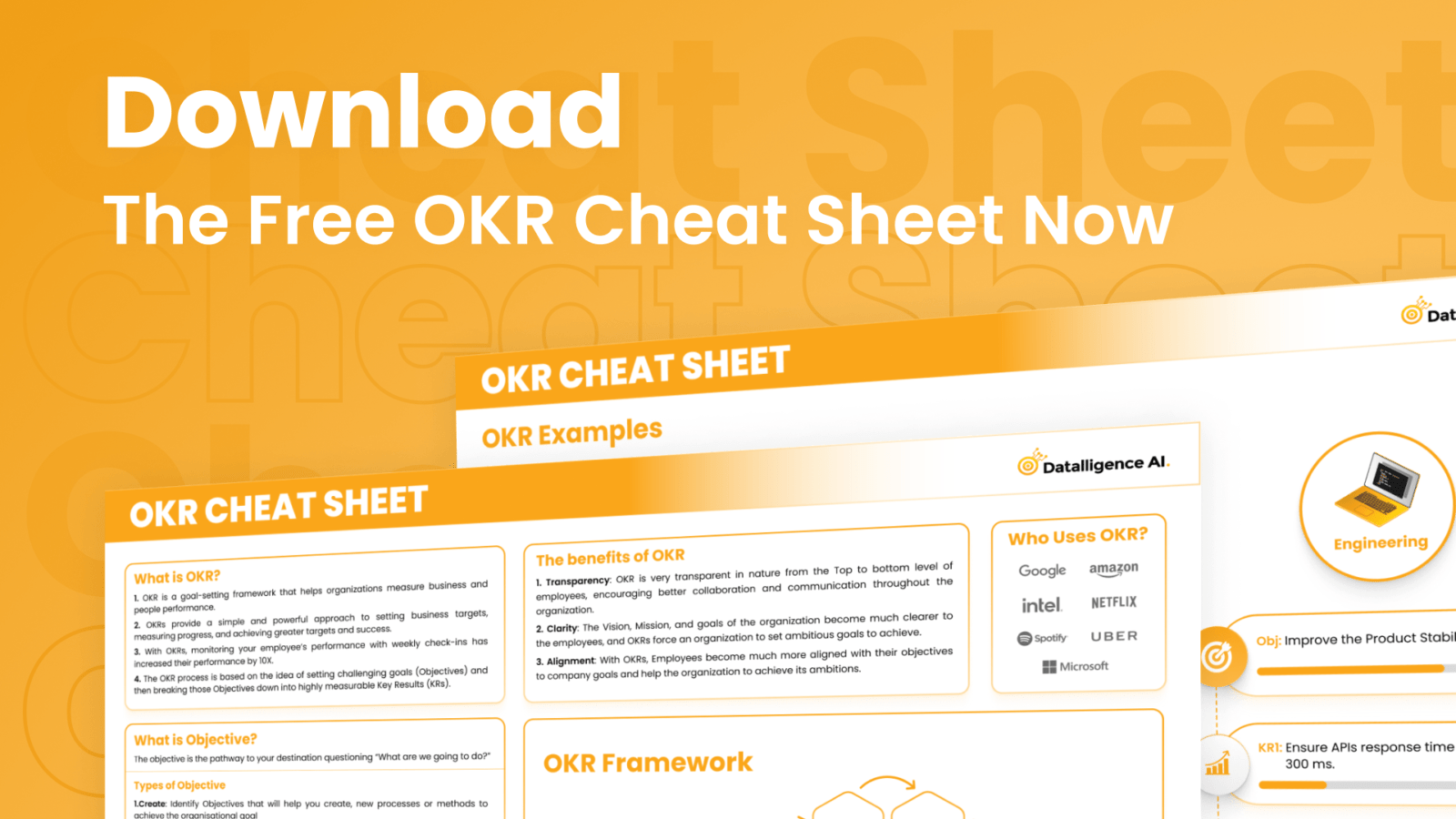In today’s fast-paced and ever-evolving business landscape, organizations must set clear objectives and track measurable results to stay competitive. The Objectives and Key Results (OKR) framework has emerged as a powerful tool for aligning teams, fostering accountability, and driving performance. CEOs play a crucial role in crafting impactful OKRs, shaping the company’s direction while inspiring and motivating their teams. By leveraging OKR examples for CEOs, leaders can set strategic goals that drive growth, innovation, and long-term success.
The guide provides insights on CEO’s OKR through numerous examples; thus helping them to understand better how goal setting works in today’s complex corporate world. From financial targets to cultural transformation, innovation, and sustainability among others we explore various goals that are well suited for the multifaceted responsibilities of a CEO.
OKR Examples for CEO
Objectives and Key Results (OKRs) are a framework for effective goal-setting aimed at promoting focus, alignment, and accountability within an organization. For a CEO, OKRs act as a tool for strategic management that translates a high-level vision into actionable plans leading to the company’s progress.
Objectives refer to the bold aims and ambitions of the CEO in a specified time frame. They should be both challenging and achievable, spurring teams to exceed their limits and strive towards excellence.
Key Results are measurable output markers showing progress towards attaining the objectives. They ensure clear success criteria thus making performance tracking easier.
By deploying OKRs, CEOs can easily communicate priorities across the whole organization leading to more team collaboration as well as ensuring all members work together towards common goals that everyone knows about.
Effect of Clear CEO OKRs on Organizational Performance
Top management in an organization can take a leaf from the highly influential example of clear CEO objectives and Key Results (OKRs) set by the Company’s top-level managers. CEOs, through setting explicit goals and measurable results, can easily concentrate their attention on what is important for the strategy of the organization. That kind of clarity provides a blue print for achieving success in business.
Additionally, CEO OKRs development promotes transparency as well as accountability at all levels of an organization. In this way, when leaders share specific targets with their team members it fosters ownership feelings and loyalty among them. Eventually, across all units within it improved productivity and performance result out of this collective endeavor.
More than that, OKR examples for CEOs promote innovation and continuous improvement within an organization. By setting ambitious but achievable goals, they encourage teams to think outside the box and strive for excellence in what they do. This shift in mindset may fuel growth, provide avenues for learning experiences while preparing the company for long-term survival.
Best Practices for Setting Effective CEO OKRs
CEO OKRs are the best practices for the effective setting of such. Thinking through this process, it should be strategic. Starting with the personal goals of CEOs to align them with the organizational goals helps keep them focused on both overall organizational and individual success.
To prioritize OKR examples for CEOs, they focus on areas that produce the most business impact. Complementing these objectives is vital because such useful goals must be specific, measurable, attainable, relevant, and time-bound.
CEO’s may have to include their goal-setting key stakeholders so as to get their views and insights as well as advice.
Periodically tracking performance against established OKRs is essential for determining progress and making necessary modifications along the way. Continuous assessment means that CEOs are able to stay flexible thereby enabling them to adjust quickly whenever there are shifts in market dynamics or internal pressures.
Strategies for Aligning Teams with CEO OKRs to Drive Organizational Success
Communication is among the most important things in linking teams to CEO OKRs and company goals. In order that every person understand how their daily responsibilities are related to wider organizational aims, OKR examples for CEOs should explain well the top-level objectives of the organization to them. By doing so, employees will clearly appreciate the importance of their jobs and this will help encourage them to deliver results necessary for overall success.
Creating regular team lead-executive check-ins helps monitor advancement toward these shared objectives. With an open line of communication, leaders can effectively deal with any stumbling blocks or problems that may arise, to keep everyone on track.
Further attention must be paid to fostering cross-departmental collaboration as well. If departments work towards common targets, they bring together diverse expertise and perspectives, leading to innovative solutions that drive growth. CEO OKRs should not only reflect individual departmental targets but also emphasize cross-functional cooperation to ensure holistic success.
For success to be achieved, teams and CEO OKRs must be aligned with corporate objectives. Company alignment towards the same goals can be attained by ensuring that everyone within an organization is working towards these goals. CEOs can lead their teams effectively in achieving strategic outcomes through clear communication, collaboration and shared understanding of priorities. In today’s competitive business environment, setting meaningful OKRs for CEOs and aligning them with team goals paves way for organizational excellence and growth.
By doing so, organizations would have a clearer path towards success as they align teams and CEO’s OKR on the backdrop of company goals. Collaboration among teammates comes about when everybody is operating under the same mission hence allowing each one to remain accountable whilst driving the firm forward. Effective alignment ensures that every team member understands their role in achieving the overarching goals set by the CEO.
Remember, setting CEO OKRs is not a one-time task but an ongoing process that requires regular review and adjustment to stay on track. By following these best practices for creating and aligning CEO OKRs with company goals, CEOs can lead their organizations towards greater success and sustainable growth.
18 Excellent OKR Examples for CEOs
Are you the CEO who wants to channel your organization in a successful way? The importance of setting clear goals cannot be overemphasized. This article explores the use of OKRs (Objectives and Key Results) by CEOs, providing practical tips on how to establish result-oriented leadership OKR examples that complement corporate vision. Therefore, let’s see how you can raise your performance as an up-to-date CEO through strategic goal setting!
Revenue Growth
Revenue growth is the key focus for many CEOs. Having a good objective would mean achieving some particular rate of revenue growth within a given period.

Drive Revenue Growth and Profitability
Driving revenue growth and maintaining profitability are critical for sustaining business success. This objective aims to enhance overall financial performance.

Enhance Customer Satisfaction and Loyalty
Customer satisfaction and loyalty are essential for long-term success. This objective focuses on improving the customer experience and retaining clients.

Improve Operational Efficiency and Effectiveness
Enhancing operational efficiency is vital for maximizing productivity and reducing costs. This objective aims to streamline operations and eliminate inefficiencies.

Enhance Leadership and Talent Development
Developing strong leadership and nurturing talent are crucial for organizational growth. This objective focuses on improving leadership capabilities and employee development.

Foster a Culture of Innovation and Continuous Improvement
A culture of innovation drives growth and competitiveness. This objective aims to encourage creativity and continuous improvement within the organization.

Strengthen Strategic Partnerships and Alliances
Building and maintaining strategic partnerships can drive growth and open new opportunities. This objective focuses on enhancing relationships with key partners.

Enhance Brand Visibility and Market Presence
Increasing brand visibility and market presence is crucial for attracting new customers and maintaining a competitive edge. This objective focuses on brand promotion and market penetration.

Improve Organizational Agility and Adaptability
Agility and adaptability are essential for responding to market changes. This objective aims to enhance the organization’s ability to adapt quickly to new challenges and opportunities.

Enhance Corporate Social Responsibility Initiatives
Corporate social responsibility (CSR) initiatives can enhance reputation and contribute to societal goals. This objective focuses on implementing effective CSR programs.

Improve Communication and Transparency
Effective communication and transparency are key to building trust within the organization. This objective aims to enhance internal communication and transparency.

Enhance Operational Resilience and Risk Management
Building resilience and managing risks effectively are crucial for long-term sustainability. This objective focuses on strengthening operational resilience and risk management practices.

Drive Product Innovation and Market Differentiation
Innovating and differentiating products is essential for staying ahead of the competition. This objective focuses on product development and market differentiation.

Optimize Supply Chain and Inventory Management
Efficient supply chain and inventory management are critical for meeting customer demand and reducing costs. This objective focuses on optimizing these processes.

Enhance Digital Transformation and Technology Adoption
Adopting new technologies is key to staying competitive in the digital age. This objective focuses on advancing digital transformation initiatives.

Strengthen Financial Management and Reporting
Effective financial management and reporting are crucial for informed decision-making. This objective focuses on improving financial processes and transparency.

Expand Global Reach and Market Penetration
Expanding into new markets is essential for growth. This objective focuses on increasing global reach and penetrating new markets.

Foster Employee Engagement and Well-Being
Engaged and well-supported employees are vital for productivity and morale. This objective focuses on enhancing employee engagement and well-being.

Leveraging Datalligence for CEO Goal-Setting in Modern Business
To set and achieve their goals effectively, modern CEOs today need to leverage data intelligence in this fast-changing business environment. By using sophisticated analytics tools, CEOs can acquire a good understanding of how their firms are performing, discover where to focus, and make informed choices that will ensure the success of their organizations.
Datalligence helps the CEO to monitor in real-time progress toward objectives, nip potential obstacles in the bud and adjust strategies accordingly. This preemptive stance keeps CEOs nimble and responsive in a volatile market landscape.
Aligning Teams and CEO Goals with Company Vision
Aligning teams and CEO goals with the company’s mission and vision is a critical component of Datalligence’s approach. The platform guides leaders through a structured process:
- Define the long-term mission and vision: Establish the organization’s long-term aspirations and purpose.
- Align annual strategies: Ensure that annual strategies align with the mission and vision.
- Break down strategies into quarterly objectives and key results: Translate annual strategies into actionable quarterly goals.
- Collaborate and communicate: Share objectives with the entire organization to gather feedback and foster buy-in.
- Guide team goal-setting: Assist individual teams in creating their own objectives and key results that contribute to the company’s overarching goals.
- Finalize and align: Finalize the company’s and teams’ OKRs, ensuring alignment with the mission and vision.
Amplifying Individual Commitment and Performance
Well-defined CEO goals instill a sense of commitment and purpose in individual team members. Datalligence empowers employees to understand how their contributions impact the company’s overall success by clearly communicating specific objectives and key results for each quarter. This heightened awareness fosters productivity and drives performance, as individuals can focus on their progress and identify areas for improvement through weekly check-ins and one-on-one sessions.
Setting Impactful CEO Goals with Datalligence
Datalligence’s collaborative approach to goal-setting is a game-changer for CEOs. By facilitating company-wide brainstorming sessions, the platform provides visibility into the goals and activities of all teams, enabling leaders to align OKRs (Objectives and Key Results) with the overall company vision. These sessions foster employee engagement and empower CEOs to create meaningful OKRs that encompass all aspects of the organization.
Once the overarching objectives are defined, Datalligence simplifies breaking them down into measurable actions or key results. This ensures a seamless transition from strategy to execution, prioritizing activities that focus on what truly matters.
CEO Goals Template
To help CEOs kickstart their goal-setting journey, Datalligence provides a comprehensive library of CEO goals templates. These templates serve as a starting point, offering a wide range of objectives and key results tailored to various leadership priorities, such as revenue growth, profitability improvement, customer satisfaction, team development, product enhancement, culture cultivation, cash flow optimization, and market expansion.
Revenue Growth: Fueling Sustainable Success
For CEOs focused on driving revenue growth, Datalligence offers a template that encompasses objectives such as closing a specific revenue target, supporting sales and marketing efforts, expanding the customer base, and implementing cost-reduction processes. Key results may include achieving revenue milestones, increasing lead generation, and identifying cost-saving opportunities.
Profitability Improvement: Maximizing Returns
Profitability is a critical metric for any business, and Datalligence provides a dedicated template to help CEOs improve their company’s bottom line. Objectives may include achieving specific EBITDA targets, streamlining budget planning processes, and increasing profit margins. Key results could involve implementing optimized budgeting methodologies, identifying cost-saving opportunities, and achieving profitability milestones.
Datalligence: Empowering CEOs to Lead with Purpose
In the ever-evolving business landscape, goal-setting is no longer a luxury – it’s a necessity. Datalligence recognizes this imperative and provides CEOs with a powerful platform to streamline the goal-setting process, align teams, and foster a culture of continuous improvement.
By leveraging Datalligence’s intuitive features, CEOs can stay informed with real-time reports, gain visibility into team objectives, and maintain focus on what truly matters. The platform’s user-friendly interface and simplified reporting process empower leaders to make data-driven decisions proactively, identifying underperforming metrics and implementing solutions promptly.
Moreover, Datalligence’s transparent goal-setting approach fosters employee engagement and inspiration. With clear priorities and a shared understanding of how individual contributions impact the company’s strategic goals, teams are motivated to perform at their best, driving productivity and overall organizational success.
In essence, Datalligence is more than just a goal-setting tool – it’s a catalyst for transformative leadership. By empowering CEOs to set aspirational yet achievable objectives, align teams towards a common vision, and cultivate a culture of accountability and continuous improvement, Datalligence equips leaders with the tools they need to thrive in today’s dynamic business environment.
So, whether you’re a seasoned CEO seeking to take your organization to new heights or a visionary leader embarking on a transformative journey, Datalligence is your trusted partner in unlocking the power of goal-setting and driving sustainable success.











